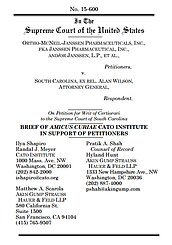Learn more about Cato’s Amicus Briefs Program.
Fool me once, shame on you; fool me twice, shame on me. In this case, the Palmetto State, following the lead of other state and federal regulators, has added a new twist to that old saying: fool no one, pay $124 million to the treasury.Ortho-McNeil-Janssen (“Janssen”) is a pharmaceutical company that distributes a popular antipsychotic drug known as Risperdal. In the 1990s and early 2000s, Risperdal was in fierce competition for market dominance and made some questionable claims about the drug’s side effects. The FDA investigated and compelled the company to correct some defective warning labels. South Carolina regulators, however, despite the FDA’s settlement of the matter, commenced state action against Janssen under the state’s Unfair Trade Practices Act. That action worked its way up to the state supreme court, which ultimately confirmed a $124 million penalty against the company. That massive fine was sustained on the theory that each labeling violation was its own violation of the statute, worth up to $5,000 each, rather than the overall labeling violation counting as one singular misdeed. Such a large penalty, disproportionate to the actual harm caused (none) runs afoul of the Eight Amendment requirement that “excessive fines [not be] imposed.” Cato has filed an amicus brief calling for the U.S. Supreme Court to reverse the decisions below and clarify the scope of the Excessive Fines Clause. South Carolina’s statute, like many similar state laws, is poorly worded and fails to define whether each individual manifestation of a regulatory violation is cognizable as an offense. Taking advantage of that lack of specificity, South Carolina converted a potential $5,000 fine into a $124 million one. Because of the huge numbers that can be achieved by multiplying even modest per-violation fines, state and federal regulators are often able to secure grandiose settlements and thereby insulate their fines from judicial review. Moreover, the state supreme court here accepted this theory in the face of no evidence of harm resulting from the allegedly improper statements. The U.S. Supreme Court has said that under the Excessive Fines clause, the monetary penalty imposed shall not be “grossly disproportional to the gravity of the defendant’s offense.” United States v. Bajakajian (1998). A finding of no harmful effect attached to 9- or 10-figure penalties blows any notion of proportionality out of the water. And South Carolina is not the only state where this is occurring. For example, an Arkansas court imposed a $1.2 billion penalty for purported misstatements about the same drug at issue here, on the theory that the Arkansas Medicaid Fraud False Claims Act was violated each time the drug was prescribed or re-filled. Other cases have revealed penalties as high as 20 or 46 times the harm suffered by consumers. The Supreme Court should take this opportunity to reaffirm that the Eighth Amendment’s Excessive Fines Clause imposes a judicially enforceable limit on grossly disproportional fines.

This work is licensed under a Creative Commons Attribution-NonCommercial-ShareAlike 4.0 International License.
